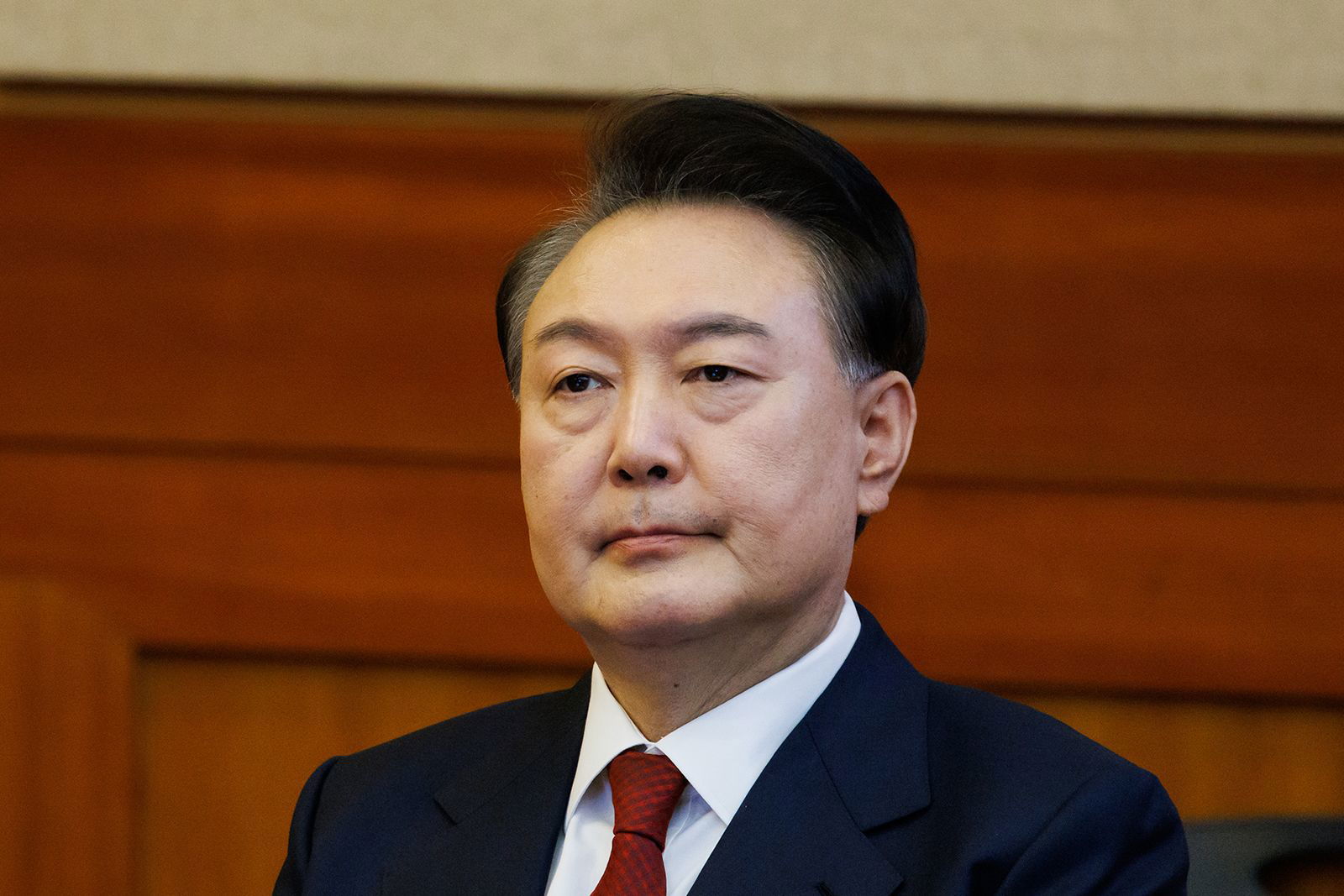South Korea’s impeached president is removed from office, four months after declaring martial law

South Korean president Yoon Suk Yeol seen here in Seoul on February 13
By Yoonjung Seo, Gawon Bae, Mike Valerio and Jessie Yeung, CNN
Seoul, South Korea (CNN) — South Korea’s highest court has removed embattled President Yoon Suk Yeol from office, ending months of uncertainty and legal wrangling after he briefly declared martial law in December and plunged the nation into political turmoil.
The court’s decision on Friday marks Yoon’s formal dismissal from the presidency after parliament voted to impeach him late last year. His removal takes effect immediately, meaning he must now leave the presidential residence, and will trigger an election to replace him.
It’s a remarkable fall from grace for the former prosecutor-turned-politician, who rose to prominence for his role in the impeachment and imprisonment of another president years ago – only to now meet the same fate.
The decision caps a long-running crisis has left a major global economy and key US ally rudderless at a fraught moment in world affairs, especially as US President Donald Trump’s “America First” agenda upends decades of foreign policy norms and dismantles the global trading system.
Friday’s unanimous ruling, delivered by the Constitutional Court’s eight justices, described the president’s actions as a “grave betrayal of the people’s trust.”
In a scathing rebuke, the court’s acting head judge Moon Hyung-bae, pointed to the chaotic night of December 3, when the president sent troops to parliament and ordered soldiers to “drag out” lawmakers, noting that such actions “cannot be justified.” There was no national emergency, said Moon, and such a decree was simply unconstitutional.
In a separate criminal trial, Yoon was arrested in January on charges of leading an insurrection, then released in March after a court canceled his arrest warrant – though it did not drop his charges.
Yoon thanked his supporters, saying it was an honor to serve as leader and that he was “sorry for not being able to meet your expectations,” following Friday’s ruling, which was met with mixed reactions across the South Korean capital.
Yoon’s opponents exploded in celebration and jubilation outside the court, waving flags and dancing to music. Many had been afraid that if he were reinstated, he could declare martial law again.
But the mood was more still and somber outside Yoon’s official residence where his conservative supporters had gathered. A representative from his ruling party said they would accept the verdict and serve the people.
The issue has been hugely divisive, with major crowds taking to the streets both for and against Yoon’s removal. Police ramped up security in the capital ahead of the verdict, setting up barriers and checkpoints, and warning against any violence.
How did we get here, and what comes next?
Yoon’s shock martial law decree had stunned the world, even shocking his own supporters and party members – with many saying that the arrival of armed troops in parliament dredged up painful memories of South Korea’s authoritarian past before it became a flourishing democracy.
Yoon made the declaration in a surprise late-night address on television, claiming it was justified by political deadlock and threats from “anti-state forces” sympathetic to North Korea. A panicked flurry ensued, with angry protesters flocking to parliament in the dead of night as lawmakers pushed past soldiers to convene an emergency vote.
They were met with troops at the building, with dramatic videos showing lawmakers jumping over parliament gates to enter the area. Their determination paid off; by midnight, enough lawmakers had voted to overturn Yoon’s decree and block martial law.
In the end, the decree only lasted six hours. By dawn, Yoon reversed the declaration, beginning four months of political disarray during which parliament also voted to impeach the prime minister and acting president.
Afterward, Yoon claimed the decree was intended as a temporary warning to the liberal opposition, and that he always planned to respect lawmakers’ will if they voted to lift it.
Even after his removal from office, Yoon remains dogged by other legal proceedings, including his insurrection trial. The criminal charge is punishable by life imprisonment or death, although South Korea has not executed anyone in decades.
Under South Korean law, a general election to choose a new president must be held within 60 days of Yoon’s removal.
One potential candidate for the country’s next president is opposition leader Lee Jae-myung, a former lawyer and lawmaker who narrowly lost to Yoon in the 2022 presidential election.
After the court verdict, Lee thanked the people who “protected the democratic Republic of Korea,” and said they would work to restore the country’s peace and economy – and to ensure something like this never happens again.
Acting President Han Duck-soo, who assumed the top office after Yoon’s impeachment, also vowed to ensure national security, and to carry out the next election following the constitution and “the will of the people who are sovereign.”
Fall from grace
Before taking office in 2022, Yoon was a star prosecutor and a key figure in the sweeping investigation of South Korea’s last impeached president, Park Geun-hye. Park was removed from office in 2017 and sentenced to prison for corruption and abuse of power in 2018.
Yoon is now the second president to be ousted by the Constitutional Court – and the shortest-serving elected leader in the nation’s democratic history.
The swift series of events marks a dramatic decline for Yoon, who was once touted as a key ally by former US President Joe Biden. During a White House state dinner in 2023, Yoon stood as the honored guest and sung Don McLean’s “American Pie” to a delighted audience.
Yoon’s serenade was meant to showcase his easy rapport with Washington, reinforcing Seoul’s strategic ties with the US. His critics, however, saw the moment as an odd distraction from pressing domestic concerns.
Back home, he clashed fiercely with the opposition, who overwhelmingly won midterm elections and used parliament to impeach key cabinet members and hold up legislation. It was this gridlock that Yoon used to try to justify his fateful decree.
This story has been updated with additional information.
The-CNN-Wire
™ & © 2025 Cable News Network, Inc., a Warner Bros. Discovery Company. All rights reserved.

